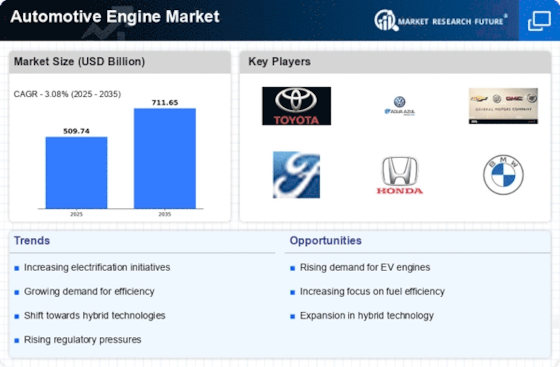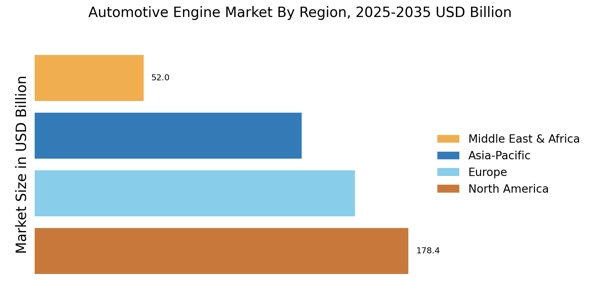Rising Demand for Fuel Efficiency
The Automotive Engine Market is experiencing a notable shift towards fuel-efficient engines, driven by increasing consumer awareness and regulatory pressures. As fuel prices fluctuate, consumers are more inclined to choose vehicles that offer better mileage. In 2025, it is estimated that fuel-efficient vehicles will account for over 60% of new car sales, reflecting a significant trend in consumer preferences. Manufacturers are investing heavily in research and development to create engines that not only meet but exceed fuel efficiency standards. This trend is further supported by government initiatives aimed at reducing carbon emissions, which are likely to bolster the demand for advanced engine technologies. Consequently, the Automotive Engine Market is poised for growth as it adapts to these evolving consumer expectations and regulatory frameworks.
Growth of Hybrid and Electric Vehicles
The Automotive Engine Market is significantly influenced by the increasing adoption of hybrid and electric vehicles. As consumers become more environmentally conscious, the demand for vehicles that utilize alternative powertrains is on the rise. In 2025, hybrid and electric vehicles are anticipated to represent approximately 30% of total vehicle sales, a substantial increase from previous years. This shift is prompting traditional automotive manufacturers to invest in developing engines that can accommodate hybrid technologies, thereby expanding their product offerings. Additionally, government incentives for electric vehicle purchases are likely to further stimulate market growth. Consequently, the Automotive Engine Market is adapting to this trend, focusing on integrating electric and hybrid technologies into their engine designs to meet evolving consumer demands.
Technological Advancements in Engine Design
The Automotive Engine Market is witnessing rapid technological advancements that enhance engine performance and efficiency. Innovations such as turbocharging, direct fuel injection, and variable valve timing are becoming increasingly prevalent. These technologies allow manufacturers to produce engines that deliver higher power outputs while maintaining lower emissions. In 2025, it is projected that engines equipped with these advanced technologies will dominate the market, potentially comprising over 70% of new engine production. Furthermore, the integration of artificial intelligence in engine management systems is likely to optimize performance in real-time, further driving the evolution of engine design. As a result, the Automotive Engine Market is expected to benefit from these advancements, leading to improved consumer satisfaction and compliance with stringent environmental regulations.
Regulatory Compliance and Emission Standards
The Automotive Engine Market is heavily influenced by stringent regulatory compliance and emission standards imposed by governments worldwide. As environmental concerns escalate, regulations aimed at reducing greenhouse gas emissions are becoming more rigorous. In 2025, it is expected that many regions will enforce stricter emission limits, compelling manufacturers to innovate and develop cleaner engine technologies. This regulatory landscape is likely to drive investments in research and development, as companies strive to meet these standards while maintaining performance. The Automotive Engine Market must navigate these challenges, which could lead to a surge in demand for engines that utilize alternative fuels and advanced emission control technologies. As a result, compliance with these regulations is not only a necessity but also a potential driver of growth within the industry.
Consumer Preference for Performance and Reliability
The Automotive Engine Market is significantly shaped by consumer preferences for performance and reliability in vehicles. As consumers increasingly seek vehicles that offer superior driving experiences, manufacturers are compelled to enhance engine performance while ensuring durability. In 2025, it is projected that engines delivering high torque and horsepower will be favored, particularly in the luxury and performance vehicle segments. This trend indicates a shift towards engines that not only meet basic transportation needs but also provide an exhilarating driving experience. Consequently, the Automotive Engine Market is likely to focus on developing high-performance engines that cater to these consumer demands, thereby fostering brand loyalty and enhancing market competitiveness.

















